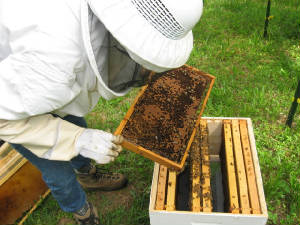Beekeeping or Preserving our Hive
Have you heard about the plight of the honeybee? The declining population has many projecting food shortages in our near future. I have been fascinated by the whole pollinating process since teaching it to first graders many years ago. It was this and my love for raspberry jam that took me to the Jordan Blackley Farm during the Appalachian Sustainable Agriculture Project’s Family Farm Tour in June. The farm was beautiful and I saw what I set out for: chicken runs, vegetable beds, mushroom production, berries in abundance and beekeeping. I wanted a look at how a young family could manage such a huge endeavor while holding other jobs and raising a small child. You see, these Herculean tasks remind me of teaching, of the importance of the teacher/student connection, and the very real possibility of extinction of the creativity that makes teaching a vibrant vocation and not just a job. I wasn’t disappointed.
I garden quite a bit and have (probably predictably) likened teaching to gardening for years. The idea that beekeeping would relate really didn’t compute. Then I asked Cindy Jordan how her bees were doing. I know other farmers whose production has diminished and others who lost their colonies altogether. How, I asked, were her hives doing? I wanted to know if she was experiencing the declining honeybee population and loss of hives that the rest of the globe was reporting. Honeybees pollinate about a third of the plants that comprise the human diet and their decline is very ominous to me. Cindy said she really hasn’t lost any bees. I was incredulous. Really? Then she told me her theory.
“We respect the bees.” My head nodded. “Many beekeepers who are in this strictly for a business feed the bees sugar water over the winter. That feels like we are robbing the bees of what is theirs.” Then she showed me her stands. I think there were five of them, they looked like wooden storage containers, standing in a row. She said, “We let the bees keep some of their honey over the winter.” Yes, I replied blandly. “The honey contains nutrients, anti-oxidants and other qualities that help the bees stay healthy. We let them keep one of those drawers that you see to sustain them through the winter.” She was kindly avoiding the beekeeping jargon that I wouldn’t understand but she could see that I still wasn’t getting it.
“What does that really mean?” I asked.
“Well, each of those drawers contains 50 gallons of honey.” I was shocked.
“Really?”
“Yes, most farmers don’t leave the honey for the bees but we feel we are honoring the relationship and we are just letting them have what is theirs.” Then came the kicker for me, the idea that connected this labor of love to education. “That represents about $5,000.”
Humble, visionary, salt-of-the-earth, hardworking, small farmer USA, is letting $5,000 yearly stay with the bees to nourish them over a cold winter and ensure the health of the hive. She even explained that if one of the stands had a super (drawer) that wasn’t quite full, they made sure they evened it out before readying them for the winter months so that the weaker hives would not run out of this amber viscous lifeline.
I left there with my head buzzing. Smiling now while I write I can see her gaze to the wildflowers and trees nearby that nourish her bees. I can feel the golden sweetness of the honey offered for sale and the conviction that what we take from this earth we also must give back. The plight of our education system is not so different. We can’t keep taking from the abundance, diminishing the quality of the teacher/student relationship in honor of the test score, NCLB, or RTT requirement. We can’t keep cutting the budget and stealing the honey and expect the schools to persist. They won’t! We have to give some of it back. Stop selling it short and cutting corners so that instead of feeding the kids we are saving money for some other agenda.
If the loss of bees points to food shortages and price increases, not to mention the loss of plants that depend on pollination, then what of the loss of a child’s promise? I know, we are still going to educate them, but when we cut programs, increase class size, let go of seasoned caring professionals, and teach to a test to make some kind of measurement, we are very likely diminishing the chance that we will have the program in place that nourishes the budding apiarist who will solve this swarming dilemma.
I see bees in my dreams, hear their hum as I envision of next year and vow never to steal their honey for my own gain. Are our students bees that swarm each August to pollinate ideas and produce rich honey? Yes, I think they are. The honey is their dreams, their creativity, their cognitive grappling of global challenges and societal strain, and yes – their acquisition of vast bodies of content that helps them connect to the world around them to create something sweet. Bees and their language are fascinating. Children – our students are equally so and similarly endangered.
A new school year is just around the corner for most of us. What will you do to preserve your hive?

